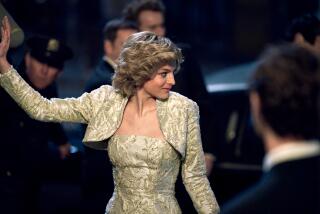Boys in Victorian Attire : Traditions Keep Grip on Britain
- Share via
LONDON — The yeoman of the royal guard assigned to search the cellars of Parliament before the sovereign’s arrival hasn’t found much since the job began in 1605. But then he doesn’t expect to.
Dressed in a brilliant red Tudor tunic and black hat, the queen’s bodyguard leads only a ceremonial search of the parliamentary cellars, a ritual faithfully conducted since a dissident soldier named Guy Fawkes planted 20 barrels of gunpowder there nearly 400 years ago in an attempt to kill King James I as he opened Parliament.
The role of another bodyguard, first assigned in 1361--to walk in front of Edward III and whack any potential troublemaker with a hefty black stick--also still survives.
Queen Led by Black Rod
The guard, known simply as Black Rod, preceded Queen Elizabeth II as she made her way to her throne in the House of Lords at last June’s state opening of Parliament.
The grand state occasion, now broadcast to millions of British homes via television, is just one of the many traditions that permeate British life, acting as reassuring symbols of continuity and stability.
Certainly every nation has its traditions, but in few cultures are they as visible, as firmly entrenched or as influential as they are in tradition-bound Britain.
“I can’t think of any other Western country in which the traditions are stronger,” noted Ralf Dahrendorf, the German-born warden, or head, of Oxford’s St. Antony’s College.
Students in Pin Stripes
Consider:
--More than half the boys at Eton College, the country’s most prestigious preparatory school, now come from middle-class backgrounds, and all of them can study computer science and modern physics--but they do so dressed in Victorian morning attire of pin-striped trousers and tails.
Compulsory top hats for the 13- to 18-year-olds went out in the 1940s, and even the stiff, rounded collars eventually were dropped in the 1960s. But Etonians preparing for the 21st Century still learn archaic forms of soccer and rugby long since abandoned elsewhere, and they must still wear the distinctive uniform first decreed by the school’s founder, King Henry VI, in the 15th Century.
--Anyone working in Oxford University’s famous Bodleian Library, whether student, visiting professor or maintenance worker, must swear an oath aloud dating back to 1602 that in part promises “not to bring into the library or to kindle therein, any fire or flame and not to smoke in the library.” According to Elaine Bland, who works in the library’s secretariat, the oath has been translated into 50 languages so international scholars know exactly what they are agreeing to.
“There are no exceptions to this rule,” she said.
--English courtroom lawyers, known as barristers, who meet for lunch in one of London’s four Inns of Court gather in the same grand halls and sit at many of the same tables as their predecessors did nearly four centuries ago. One of these inns issues a 20-page booklet so that newcomers who might be confused by the extensive ritual can quickly learn, for example, the procedure for correcting an error at grace (a note, preferably in Latin, to the Master Treasurer, humbly drawing attention to the mistake).
‘Medieval Oligarchies’
The inns’ penchant for tradition has been matched only by their ability to retain a tight grip over the profession by controlling England’s only postgraduate education program for barristers as well as student living accommodations, a development that led one commentator to describe them as “medieval republican oligarchies.”
--The Duchy of Lancaster disappeared as a geographical entity in the 15th Century and the use of the Privy Seal, the instrument of royal prerogative, was abolished 103 years ago, yet among those who sit at Prime Minister Margaret Thatcher’s Cabinet table are both a Chancellor of the Duchy of Lancaster and a Lord Privy Seal.
There is little mystery behind the strength of Britain’s many traditions. After all, the country has enjoyed a historical continuity rare among nations, suffering neither invasion nor foreign subjugation in nearly a thousand years and avoiding the turmoil and radical change of lasting revolution.
Yet other factors have allowed Britain to maintain so much of its past as living heritage.
Not the least of these was the decision, by malcontents, religious rebels, adventurers and others who found the constraints of tradition too stultifying, to seek new lives in North America, Australia or New Zealand rather than stay and fight to change them.
Ability to Adapt
But another reason for the resilience of British traditions is that many institutions here have demonstrated a unique ability to adapt gradually while appearing to remain the same.
The British sovereign, once the world’s most powerful ruler, has been reduced by time and modernity to a mainly figurehead role, yet in style, the queen retains the mystique of her forebears. As a consequence, admiration for, and preoccupation with, British royalty has rarely been greater than it is today.
The House of Lords, that ancient, semi-hereditary, upper house of Parliament that epitomizes privilege, is today the place where Britain’s socialist Labor Party hopes to delay some of Thatcher’s legislative program. A highly controversial Thatcher proposal to eliminate property taxes in favor of a head tax on all adults is one key issue that Labor hopes to derail in the Lords.
Large numbers of life peers appointed over the last two decades have helped Labor shave Thatcher’s majority in the Lords to a slim 10 votes, compared to her comfortable 101-seat margin in the House of Commons.
“The British genius is preserving form while changing the substance,” suggested Peter Hennessy, co-director of the Institute of British Contemporary History here.
English Common Law
George Gaskell, a social psychologist at the London School of Economics, cited the implicit message of English Common Law and its foundation on legal precedence that the past helps measure and govern the present.
He noted, for example, that the modern urban transit system planned for the city of Sheffield has been subjected, without a raised eyebrow, to the 19th Century Tramways Act, a piece of legislation drafted for horse-drawn vehicles.
But above all, traditions thrive here because they are widely valued both as symbols of continuity and stability and because they are seen as having served the nation well.
“Britons are seduced by a love of ritual,” observed the respected social commentator Anthony Sampson. “It is very comfortable and reassuring.”
Brian Walder, a television journalist and a former member of Parliament, recalled his surprise at the public reaction when proceedings in a Miami courtroom were televised in Britain.
Wig and Red Robe
“People were upset that the judge seemed to have no aura of authority,” Walden said. “The British want their judge in a wig and red robe and to sit high up by himself and be aloof, not because of their utility, but because these things convey the majesty of the law.”
Few of Britain’s traditions have a greater impact than its Royal Family, one of the most successful symbols of nationhood anywhere.
The July, 1986, wedding of Elizabeth II’s second son, Andrew, a lesser-known royal figure at the time, transfixed the nation and drew a global television audience estimated at 500 million--a statistic that reflects a fascination for British tradition far beyond the country’s own borders.
The British social calendar is still shaped by the movements of royalty, whether it be for an opening night at the opera, the Wimbledon tennis tournament or racing at the Royal Ascot.
“Wimbledon and Ascot are treated as a great way to entertain business clients, because it doesn’t matter whether you like tennis or racing; the importance is being there at a royal occasion,” maintained Gaskell.
Clerk of the Closet
Long after the constitutional monarchs of Scandinavia, the Netherlands and Belgium adjusted their life styles to the political realities of their positions, the British Royal Family lives in relative grandeur, with a household staff of about 350 and a retinue that includes such figures as the clerk of the closet, a traveling yeoman and a page of the backstairs.
The impact of Britain’s strong sense of heritage extends well beyond the quaint symbols so enjoyed by foreign visitors.
Social scientists believe the strength of Britain’s traditions reinforces a sense of social stability and helps explain the relative failure of political radicalism in the country.
Traditions can definitely be useful. Thatcher used the archaic but respected titles of Lord Privy Seal and Chancellor of the Duchy of Lancaster to achieve Cabinet standing for two important aides.
But tradition also acts to block change, which, some critics believe, explains Britain’s lack of dynamism through much of the 20th Century.
No Tampering with Tradition
“One of the greatest barriers to innovation is the argument that ‘it’s always been done this way,’ ” said Gaskell. “In this society, the first question asked is ‘Why do people want to tamper with this?’ ”
At Queens University in Belfast, Northern Ireland, for example, a door in the history department, clearly hinged on the wrong side, for decades has delivered anyone walking through it directly into a wall, rather than into the central portion of a pleasant office. But the hinges have never been reversed.
“In your country, that door would be changed around in a week,” historian A.T.Q. Stewart told an American visitor. “Here, it stays as it is because that’s the way it’s always been.”
During her years as prime minister, Thatcher has exhibited little patience for such thinking, constantly cajoling her countrymen to adopt modern ideas and methods.
She has repeatedly attacked many of the less visible but equally well-established traditions, such as the unusual autonomy and impartiality of key institutions that have shaped much of British life in the past.
Thatcher’s Dislike
Her attempts to limit the British Broadcasting Corp.’s editorial freedom, to politicize the upper echelon of the traditionally impartial civil service and to curtail the much-valued autonomy of major universities, including Oxford and Cambridge, by reducing their level of independent funding, have been highly controversial and only partially successful.
“She sees tradition as economically unproductive,” said Oxford’s Dahrendorf. “She dislikes it.”
Together with a growing immigrant population that finds little in common with the country’s rituals, the impact of Thatcher’s views worries some social scientists.
“They are making a moderate, stable society more unstable,” Dahrendorf said.
Still, there has been little visible erosion of tradition as a powerful force here.
Politics aside, some traditions do eventually die.
J. Richard Hill, who administers Middle Temple Inn, one of London’s four Inns of Court, noted the fate of an old horn that for hundreds of years sounded each evening half an hour before dinner. The signal, initiated in the 1600s to alert members hunting game in the fields across the Thames River, was finally retired in 1978--well over a century after the last open fields across the Thames gave way to industrial warehouses.
“It had become old and fragile and we couldn’t get anyone who was very good at blowing it,” Hill explained. “We decided it was better to curtail a custom than continue it badly.”
More to Read
Sign up for Essential California
The most important California stories and recommendations in your inbox every morning.
You may occasionally receive promotional content from the Los Angeles Times.










